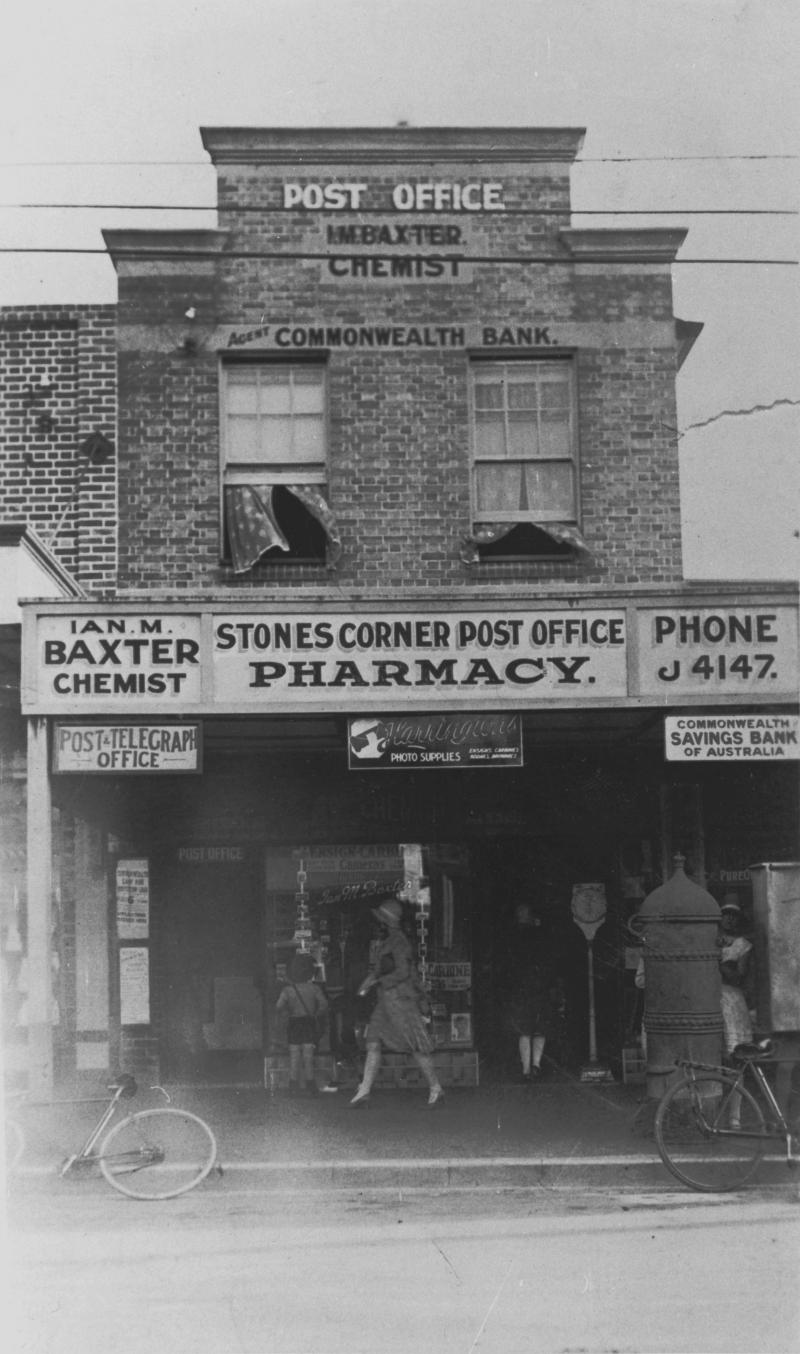Addresses
Type of place
Shop/s, Post / telegram office
Period
Victorian 1860-1890
Style
Free Classical
Addresses
Type of place
Shop/s, Post / telegram office
Period
Victorian 1860-1890
Style
Free Classical
Built in 1888, the former Thomason Brothers & Co. chemist played an important role in the history of Stones Corner. As one of the first commercial buildings in this part of the city, the two storey brick shop reflects the increase in population in the area due to the subdivision and sale of small, residential plots of land. Built by Thomas Watson Thomason, a successful chemist with a chain of stores in Brisbane, the commercial building maintained its use as a chemist well into the twentieth century. This building also served as a pivotal community meeting place when part of it was used as the Stones Corner Post Office from around 1923.
Also known as
Stones Corner Post Office
Lot plan
L300_SP141272
Key dates
Local Heritage Place Since —
Date of Citation —
Construction
Roof: Corrugated iron;Walls: Face brick
Criterion for listing
(A) Historical; (E) AestheticInteractive mapping
Also known as
Stones Corner Post Office
Lot plan
L300_SP141272
Key dates
Local Heritage Place Since —
Date of Citation —
Construction
Roof: Corrugated iron;Walls: Face brick
Criterion for listing
(A) Historical; (E) AestheticInteractive mapping
History
From the mid 1870s the population of Brisbane increased markedly and a rise in residential settlement began to occur. Brisbane’s population had grown to 47, 000 by 1881. It was during the 1880s that the greatest changes to the residential settlement patterns occurred. This was due to several factors including an expanding economy, expansion of infrastructure including extended tram and train services, improved communication systems, and an increase in immigration to Brisbane. By 1891 Brisbane’s population had increased to over 100, 000.
The Stones Corner area was named after the first white settler in the area, James Stone, an English immigrant who arrived in Brisbane on board the Mary Pleasants in 1857. By 1872 he and his family had purchased a one acre block on the corner of Old Cleveland Road and Logan Road and by 1884 had built a large home on the site. Stones Corner began its life as a commercial centre in 1890 with the opening of the Junction Hotel, now called the Stones Corner Hotel. As the area around the corner increasingly became settled commercial premises were established for the servicing of the residents. In the 1890s Stones Corner was a small centre for trade compared to the shopping district at South Brisbane on Stanley Street, but with improved road and public transport access the junction of Logan and Old Cleveland Road thrived over the years.
By the 1890s, the Stones Corner and Coorparoo area included a socio-economic mix that ranged from farmers to politicians. These included Frederick Brentnall M.L.C., James Stodart M.L.A. and Walter Henry Barnes M.L.A., business men such as Nathaniel Lade, James Hipwood and Reuben Nicklin and important public servants such as Edward Deshon C.M.G., Reginald Mulholland King, James Evan Burstall and T.W. Connah. Coorparoo, while not distant from the city, was a semi-rural area until the 1910s. Then the population began to increase rapidly due to the extension of the tramline to Stones Corner in 1915.
303 Logan Road was built in 1888 for Thomas Watson Thomason, a successful Brisbane chemist. Prior to the establishment of this business, Thomason had other businesses in Brisbane. By the time the Stones Corner store was opened in 1888 Thomason Bros. had another four chemist and dentist shops in Brisbane, two on Stanley Street and one in Queen Street. An advertisement in the 1887 Post Office Directories reads: “Thomason Bros., Surgical and Mechanical Dentists, Stanley Street, South Brisbane and Woolloongabba. All work performed with Neatness, Efficiency, and Despatch at Moderate Rates”.
He and his brothers conducted the pharmaceutical business there until 1919 when William Pearce, also a chemist purchased the business. A succession of chemists purchased and occupied this building and around 1923, when Wilfred Illife moved into the building, one half was occupied by his pharmacy and the other was taken over by the Stones Corner Post Office and the Commonwealth Bank. This building served as a pivotal community meeting place during the first decades of the twentieth century, offering postal, telegraphic and banking services, as well as a pharmacy from 1888 until well into the twentieth century.
Statement of significance
Relevant assessment criteria
This is a place of local heritage significance and meets one or more of the local heritage criteria under the Heritage planning scheme policy of the Brisbane City Plan 2014. It is significant because:
Supporting images

Stones Corner Post Office, chemist and Commonwealth Bank, Brisbane, ca. 1928 (Source: State Library of Queensland, Negative No. 35087).
References
-
Historic Titles, Department of Natural Resources and Water
-
Queensland Post Office Directories
-
Metropolitan Water and Sewage Survey Maps, 1949
-
Coorparoo, Stones Corner Centenary, 1856 – 1956, Printed by The Courier Mail, 1956
Citation prepared by — Brisbane City Council (page revised October 2023)

